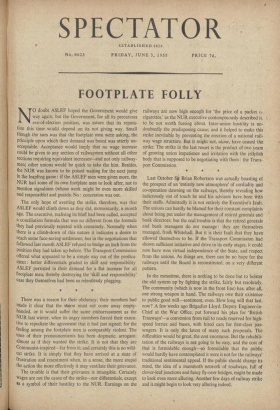FOOTPLATE FOLLY
NO doubt ASLEF hoped the Government would give way again; but the Government, for all its precarious eve-of-election position, was aware that its reputa- tion this time would depend on its not giving way. Small though the sum was that the footplate men were asking, the principle upon which their demand was based was utterly un- acceptable. Acceptance would imply that no wage increase could be given to any section of railwaymen without all other sections requiring equivalent increasev—and not only railway- men; other unions would be quick to take the hint. Besides, the NUR was known to be poised waiting for the next jump in the leapfrog game: if the ASLEF men were given more, the NUR had some of its own footplate men to look after, not to mention signalMen (whose work might be even more skilled and responsible) and guards. No : concession was out.
The only hope of averting the strike, therefore, was that ASLEF would climb down as they did, momentarily, a month ago. The executive, realising its bluff had been called, accepted a conciliation formula that was no different from the formula they had previously rejected with contumely. Normally when there is a climb-down of this nature it indicates a desire to reach some face-saving settlement; but in the negotiations that followed last month ASLEF refused to budge an inch from the pOsition they had taken up before. The Transport Commission offered what appeared to be a simple way out of the predica- ment : better differentials graded to skill and responsibility. ASLEF persisted in their demand for a flat increase for all footplate men, thereby destroying the 'skill and responsibility' case they themselves had been so relentlessly plugging.
There was a reason for their obduracy; their members had made it clear that the anion must not come away empty- handed, or it would suffer the same embarrassment as the NUR last winter, when its angry members forced their execu- tive to repudiate'the agreement that it had just signed; for the feeling among the footplate men is comparably violent. The tone of their pronouncements has been dogmatic, arrogant; almost as if they wanted the strike. It is not that they are Communist-inspired—far from it; and certainly this is no wild- cat strike. It is simply that they have arrived at a state of frustration and resentment when, in a sense, the more stupid the action the more effectively it may ventilate their grievance.
The trouble is that their grievance is intangible. Certainly wages are not the cause of the strike—nor differentials, except as a symbol of their hostility to the NUR. Earnings on the railways are now high enough for 'the price of a packet of cigarettes,' as the NUR executive contemptuously described it, to be not worth fussing about. Inter-union hostility is un- doubtedly the predisposing cause; and it helped to make this strike inevitable by preventing the erection of a national rail- way wage structure. But it might not, alone, have caused the strike. The strike in the last resort is the product of two years of growing union impatience and irritation with the jellyfish body that is supposed to be negotiating with them : the Trans- port Commission.
Last October Sit Brian Robertson was actually boasting of the prospect of an 'entirely new atmosphere' of cordiality and co-operation dawning on the railways, thereby revealing how ludicrously out of touch he and his advisers have been with their staffs. Admittedly it is not entirely the Executive's fault. The unions can hardly be blamed for their constant complaints about being put under the management of retired generals and bank directors; but the real trouble is that the retired generals and bank managers do not manage : they are themselves managed, froth Whitehall. But it is their fault that they have, allowed themselves to be. If the Transport Commission had shown sufficient initiative and drive in its early stages, it could now have won virtual independence of the State, and respect from the unions. As things are, there can be no hope for the railways until the Board is reconstituted, on a very different pattern.
In the meantime, there is nothing to be done but to bolster the old system up by fighting the strike, fairly but resolutely. The community (which is now in the front line) has, after all, one strong weapon in hand. The railways owe their existence to public good will—sentiment, even. How long will that last, now? A few weeks ago Brigadier Lloyd; Deputy Engineer-in- Chief at the War Office, put forward his plan for 'British Trueways'—a conversion from rail to roads reserved for high- speed lorries and buses, with hired cars for first-class pas- sengers. It is only the latest of many such proposals. The difficulties would be great, the cost enormous. But the rehabili- tation of the railways is not going to be easy, and the cost of that is formidable enough—so formidable that the public would hardly have contemplated it were it not for the railways' traditional sentimental appeal. If the public should change its mind, the idea of a mammoth network of roadways, full of clover-leaf junctions and fancy fly-over bridges, might be made to look even more alluring. Another few days of railway strike and it might begin to look very alluring indeed.


































 Previous page
Previous page